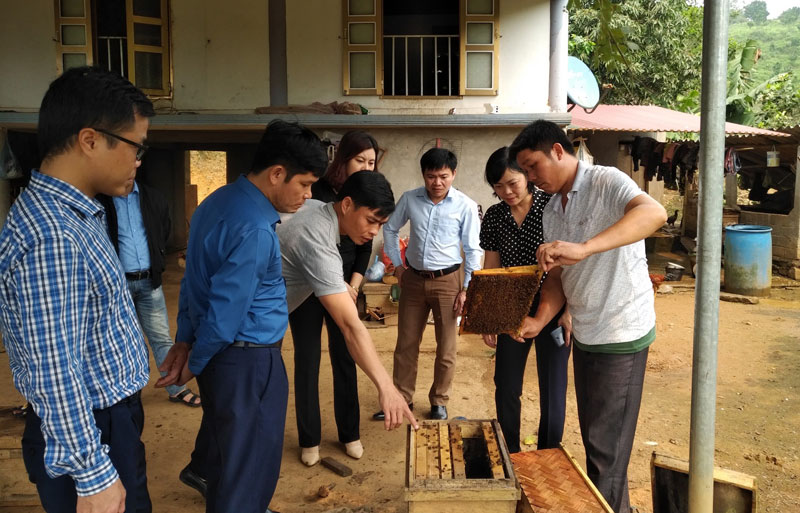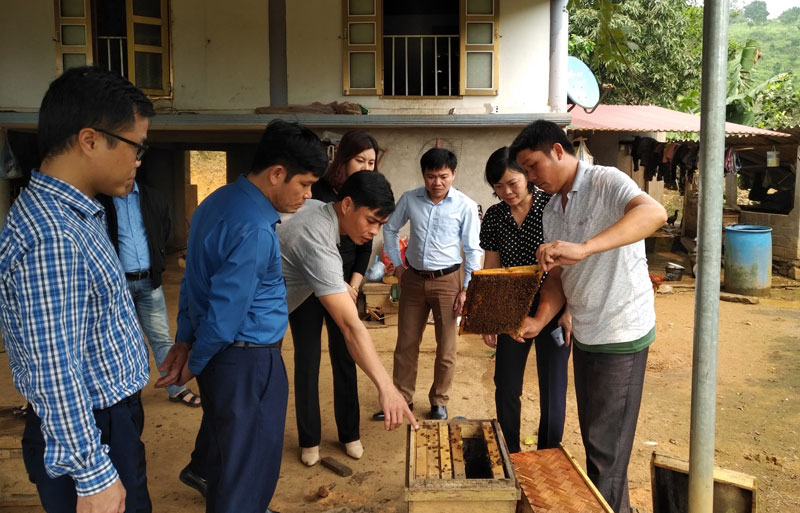
(HBO) – Phase II of the Forest and Farm Facility (FFF) programme has been carried out by Hoa Binh province Farmers’ Association since 2019. It aims to raise capacity of forest growers, families, women, youths and people of ethnic minority groups, facilitating poverty reduction and climate change adaptation.
 Officers of the
provincial Farmers’ Association survey, assess a beekeeping model in Phase II of
the FFF programme in Tu Ne commune (Tan Lac district).
Officers of the
provincial Farmers’ Association survey, assess a beekeeping model in Phase II of
the FFF programme in Tu Ne commune (Tan Lac district).
The association surveyed and decided to implement the
programme in An Binh commune (Lac Thuy district) and the communes of Dong Lai
and Tu Ne (Tan Lac district). Its project management board joined hands with local
authorities and Farmers’ Associations of districts and communes to set up key
groups at the communal level.
Training courses were arranged for members of the groups to
improve their skills and promote understanding of teamwork’s benefits, in a bid
to develop forests and farms along with keeping with environmental protection.
They were hoped to help women, youths and people of ethnic
minority groups in sustainable production of agro-forestry-fishery goods,
raising values of forests and improving landscapes and income.
The Muong Cu forest growing and beekeeping group in Cu
village of Tu Ne commune is said to be among the most effective models operated
by farmers. At present, 20 farmer households join the group, keeping a total of
600 colonies of honey bee.
Through the FFF programme, members were able to take part in
training courses in beekeeping, business skills and policy dissemination, among
others.
After one year of implementation, Phase II of the FFF programme
has seen initial results, creating a driving force for the community and
farmers to continue activities in the forest-based sector.
Three cooperatives have been set up and run effectively,
generating jobs for local workers.
The programme also facilitated the establishment of two
groups on beekeeping and growing citrus trees in Tu Ne commune, a group on
organic pomelo cultivation in Dong Lai commune (Tan Lac ditrict) and a model of
raising chickens in An Binh commune (Lac Thuy).
Products of the groups and cooperatives are shipped to various
markets with stable prices. Tens of local workhands earn stable jobs with an
average monthly income of 5 million VND (215 USD)./.
According to data from the Hoa Binh Provincial Party Committee, the industrial production index for the first six months of 2025 is estimated to have increased by 20% compared to the same period last year. This marks the highest year-on-year growth rate for this period since 2020.
In the first six months of 2025, Hoa Binh province’s export turnover was estimated at 1.145 billion USD, marking an 18.11% increase compared to the same period in 2024. Import turnover was estimated at $ 804 million, a 17.15% increase, which helped the province maintain a positive trade balance.
The lives of the ethnic minority farmers in Tan Lac district have gradually improved thanks to the new directions in agricultural production. This is a testament to the collective strength fostered through the professional associations and groups implemented by various levels of the district’s Farmers’ Union.
With the motto the "product quality comes first,” after nearly one year of establishment and operation, Muong village’s Clean Food Agricultural and Commercial Cooperative, located in Cau Hamlet, Hung Son Commune (Kim Boi district), has launched reputable, high-quality agricultural products to the market that are well-received by consumers. The products such as Muong village’s pork sausage, salt-cured chicken, and salt-cured pork hocks have gradually carved out a place in the market and they are on the path to obtaining the OCOP certification.
In the past, the phrase "bumper harvest, rock-bottom prices" was a familiar refrain for Vietnamese farmers engaged in fragmented, small-scale agriculture. But today, a new spirit is emerging across rural areas of Hoa Binh province - one of collaboration, organisation, and collective economic models that provide a stable foundation for production.
Maintaining growing area codes and packing facility codes in accordance with regulations is a mandatory requirement for agricultural products to be eligible for export. Recently, the Department of Agriculture and Environment of Hoa Binh province has intensified technical supervision of designated farming areas and packing facilities to safeguard the "green passport" that enables its products to access international markets.



 Officers of the
provincial Farmers’ Association survey, assess a beekeeping model in Phase II of
the FFF programme in Tu Ne commune (Tan Lac district).
Officers of the
provincial Farmers’ Association survey, assess a beekeeping model in Phase II of
the FFF programme in Tu Ne commune (Tan Lac district).